RBSE Solutions for Class 8 Maths Chapter 7 Cube and Cube Roots Ex 7.1
Rajasthan Board RBSE Solutions for Class 8 Maths Chapter 7 Cube and Cube Roots Ex 7.1 Textbook Exercise Questions and Answers.
RBSE Class 8 Maths Solutions Chapter 7 Cube and Cube Roots Ex 7.1
Question 1.
Which of the following numbers are not perfect cubes?
(i) 216
Answer:
216 = 2 × 2 × 2 × 3 × 3 × 3
= 23 × 33
= (6)3
Which is a perfect cube.
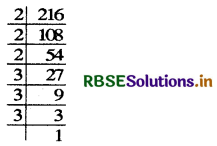

(ii) 128
Answer:
We have
128 = 2 × 2 × 2 × 2 × 2 × 2 × 2
Grouping the prime factors of 128 into triples, we are left over with 2 as ungrouped factor.
∴ 128 is not a perfect cube.
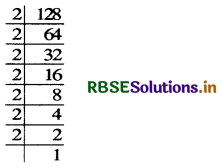
(iii) 1000
Answer:
1000 = 2 × 2 × 2 × 5 × 5 × 5
= (2)3 × (5)3 = (10)3
Which is a perfect cube.
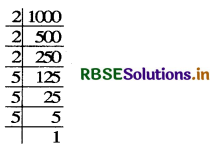
(iv) 100
Answer:
100 = 2 × 2 × 5 × 5
Grouping the prime factors into triples, we do not get any triples. Factors 2 × 2 and and 5 × 5 are not in triples.
∴ 100 is not a perfect cube.
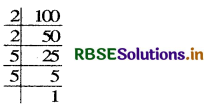

(v) 46656
Answer:
46656 = 2 × 2 × 2 × 2 × 2 × 2 × 3 × 3 × 3 × 3 × 3 × 3
Clearly the prime factors of 46656 can be grouped into prime factors and no factor is left over.
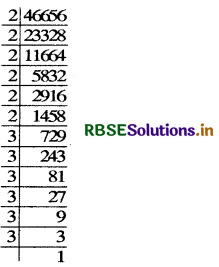
Question 2.
Find the smallest number by which each of the following numbers must be multiplied to obtain a perfect cube.
(i) 243
Answer:
Writing 243 as a product of prime factors, we have
243 = 3 × 3 × 3 × 3 × 3
Clearly, to make it a perfect cube, it must be multiplied by 3.
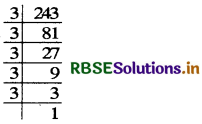
(ii) 256
Answer:
Resolving 256 into prime factors, we find that
256 = 2 × 2 × 2 × 2 × 2 × 2 × 2 × 2
Clearly, to make it a perfect cube, it must be multiplied by 2.
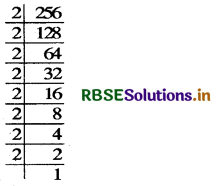

(iii) 72
Answer:
Resolving 72 as a product of prime factors, we have
72 = 2 × 2 × 2 × 3 × 3
Clearly, to make it a perfect cube, it must be multiplied by 3.
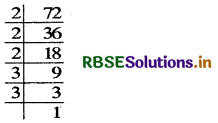
(iv) 675
Answer:
Resolving 675 as a product . of prime factors, we have
675 = 3 × 3 × 3 × 5 × 5
Clearly, to make it a perfect cube, it must be multiplied by 5.
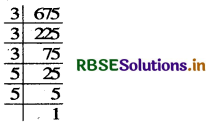
(v) 100
Answer:
Writing 100 as a product of prime factors, we have,
100 = 2 × 2 × 5 × 5
Clearly, to make it a perfect cube, it must be multiplied by 2 × 5, i.e. 10. Ans.
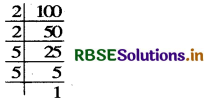

Question 3.
Find the smallest number by which each of the following numbers must be divided to obtain a perfect cube.
(i) 81
Answer:
Writing 81 as a product of prime factors, we have
81 = 3 × 3 × 3 × 3
Clearly, to make it a perfect cube, it must be divided by 3.
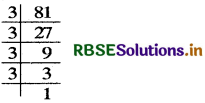
(ii) 128
Answer:
Writing 128 as a product of prime factors, we have
128 = 2 × 2 × 2 × 2 × 2 × 2 × 2
Clearly, to make it a perfect cube, it must be divided by 2.
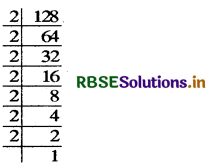
(iii) 135
Answer:
Writing 135 as a product of prime factors, we have
135 = 3 × 3 × 3 × 5
Clearly, to make it a perfect cube, it must be divided by 5.
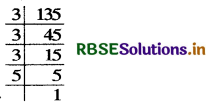
(iv) 192
Answer:
Writing 192 as a product of prime factors, we have
192 = 2 × 2 × 2 × 2 × 2 × 2 × 3
Clearly, to make it a perfect cube, it must be divided by 3.
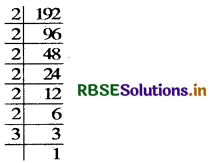

(v) 704
Answer:
Writing 704 as a product of prime factors, we have
704 = 2 × 2 × 2 × 2 × 2 × 2 × 11
Clearly, to make it a perfect cube, it must be divided by 11.
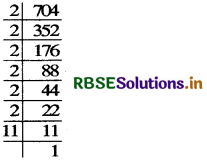
Question 4.
Parikshit makes a cuboid of plasticine of sides 5 cm, 2 cm, 5 cm. How many such cuboids will he need to form a cube?
Answer:
Volume of a cuboid = 5 × 2 × 5
= 2 × 5 × 5
To make it a cube, we require 2 × 2 × 5, i.e., 20 such cuboids.
